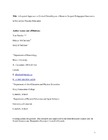| dc.contributor.creator | Ní Chróinín, Déirdre | |
| dc.contributor.creator | Fletcher, Tim | |
| dc.contributor.creator | O’Sullivan, Mary | |
| dc.date.accessioned | 2019-03-12T10:50:37Z | |
| dc.date.available | 2019-03-12T10:50:37Z | |
| dc.date.issued | 2016 | |
| dc.identifier.citation | Fletcher, T., Ní Chróinín, D., O'Sullivan, M. (2016) 'A Layered Approach to Critical Friendship as a Means to Support Pedagogical Innovation in Preservice Teacher Education.' Studying Teacher Education 12(3), pp. 302-319. DOI: 10.1080/17425964.2016.1228049. | en_US |
| dc.identifier.uri | http://hdl.handle.net/10395/2714 | |
| dc.description | A layered approach to critical friendship as a means to support pedagogical innovation in pre-service teacher education. | en_US |
| dc.description.abstract | In this paper we describe and interpret how two distinct layers of critical friendship were used to support a pedagogical innovation in pre-service teacher education. The innovation (called Learning About Meaningful Physical Education, or LAMPE) focuses on ways to teach future teachers to foster meaningful experiences for learners in physical education. Critical friendship was applied in two ways: (a) the first two authors served as critical friends to each other as they taught their respective teacher education courses using LAMPE, and (b) the third author acted as a “meta-critical friend”, providing support for and critique of the first two authors’ development and enactment of the innovation. Over two years, data were gathered from reflective journal entries, emails, recorded Skype calls, and teaching observations. The two layers of critical friendship held significant benefits in advancing and supporting the development of the innovation while also contributing to the professional learning of all participants. Analysis of the first year’s data showed we entered the critical friendship without thoroughly considering what we each hoped to give and take from the relationship or acknowledging the potential problems that might unfold. In the second year of the research and based on suggestions from our metacritical friend, we took a more rigorous inquiry stance as critical friends, contributing contentious feedback, and pushing each other outside of our personal and pedagogical comfort zones. This led to a noticeable improvement in our professional learning about teacher education practice and advanced the development of the LAMPE innovation. | en_US |
| dc.language.iso | eng | en_US |
| dc.publisher | Taylor & Francis [Routledge] | en_US |
| dc.relation.ispartofseries | 12;3 | |
| dc.rights.uri | https://doi.org/10.1080/17425964.2016.1228049 | en_US |
| dc.subject | Pedagogy | en_US |
| dc.subject | Physical education | en_US |
| dc.subject | Interactivity | en_US |
| dc.subject | Professional learning | en_US |
| dc.subject | Self-study | en_US |
| dc.title | A layered approach to critical friendship as a means to support pedagogical innovation in pre-service teacher education (Pre-published version) | en_US |
| dc.type | Article | en_US |
| dc.type.supercollection | all_mic_research | en_US |
| dc.type.supercollection | mic_published_reviewed | en_US |
| dc.description.version | Yes | en_US |
| dc.identifier.doi | 10.1080/17425964.2016.1228049 | |


